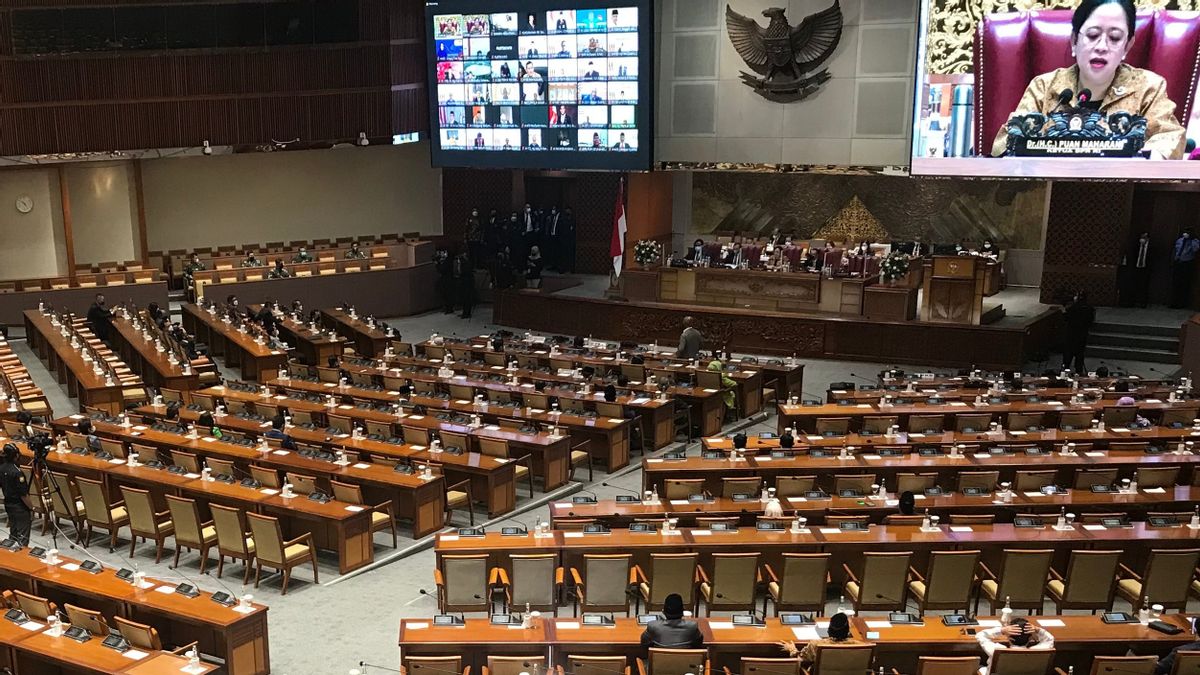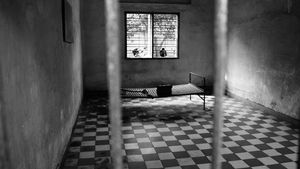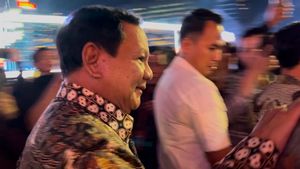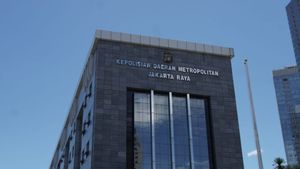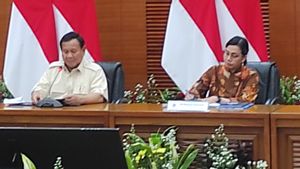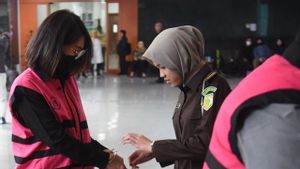JAKARTA - The DPR has officially passed the Correctional Bill as a law. The chairman of the DPR, Puan Maharani, said that the Correctional Law needs to be formed to accommodate the development of the law today.
The ratification of the Correctional Law was carried out in the DPR Plenary Meeting which was held at the Nusantara II Building, Parliament Complex, Senayan, Jakarta, Thursday, July 7. In the previous meeting at Commission III of the DPR, all factions had agreed to ratify the Correctional Bill.
"UU on Corrections needs to be formed to accommodate legal developments with a shift in the concept of treatment of prisoners with a deterrence approach to become the goal of social reintegration," said Puan in a written statement.
The process of social reintegration regulated in the Correctional Law focuses on creating justice, balance, restoration of relations, legal protection, and guarantees for the human rights of prisoners, children, prisoners, foster children, victims, and the community.
The restoration of relations is carried out so that Detention and Children can be restored to their dignity in society and re-accepted by the community and victims.
The Correctional Law prioritizes coaching efforts to bring prisoners back to fully realize their mistakes. Through this law, said Puan, it is hoped that prisoners will no longer commit acts that violate the law so that they can return and be accepted by the public.
"Of course, the Correctional Law is a strengthening of the correctional system, which so far has experienced various developments and dynamics as part of supporting the criminal justice system," said the PDI-P politician.
The Requirement Law also regulates the implementation of the Correctional System based on the principle of protection, non-discrimination, humanity, mutual cooperation, independence, proportionality, loss of independence, and professionalism.
"This is in accordance with the 1945 Constitution which states that everyone has the right to be free from torture or acts that demean human dignity," said Puan.
Not only the Correctional Law, the DPR Plenary Meeting today also ratified the Law on Psychological Education and Services. This law contains rules related to the psychological practice services of education and psychologists, governance of quality guarantees, partnerships, financing, to professional organizations.
The DPR has also inaugurated the Bill on the Establishment of Southwest Papua Province and the Bill on Conservation of Biological Natural Resources and Their Ecosystems into a DPR initiative bill. Today's plenary session also closes the V Session Period for the 2021-2022 Session Year.
Before delivering the closing speech for the trial period, Puan on behalf of the DPR again expressed her condolences for the death of the Minister of Administrative Reform and Bureaucratic Reform, Tjahjo Kumolo, last Friday (1/7).
"May Allah SWT accept his deeds of worship and he will get the best place with God the Most Gracious and Merciful. And may the extended family he left behind be given additional fortitude and patience," said Puan.
During the V Session Period for the 2021-2022 Session Year, the DPR is said to have passed 11 bills into law. The DPR has also approved 4 bills as DPR Initiative Bills, including the Bill on Maternal and Child Welfare (RUU KIA).
The KIA Bill has strategic values in an effort to maintain and improve the quality of Indonesia's human resources. Therefore, the Indonesian House of Representatives is determined to immediately complete its discussion during the next session," explained Puan.
The DPR and the Government have also discussed the PPKF (Macro Economic Policy and the Principles of Fiscal Policy) for the 2023 Fiscal Year. Puan said that the 2023 APBN needs to anticipate various global dynamics, geopolitical conflicts, development of global monetary policy, and the price of strategic commodities that can affect the fiscal policy of the State Budget and the resilience of the APBN. "The state budget, as an instrument to improve people's welfare, is increasingly required to carry out effective programs to complete people's affairs and be efficient in program governance that can make it easier for the people to get their benefits," said the former Coordinating Minister for Human Development and Culture.
During this session, the DPR also received a Report of Examination Results on the Central Government Financial Report (LHP LKPP) in 2021 by BPK RI, where BPK provided an Unqualified Opinion of WTP on LKPP in 2021. Puan mentioned that 27 BPK findings were related to the weaknesses of the Internal Control System (or SPI) and non-compliance with the provisions of the legislation.
"Although these findings do not have a material impact on the fairness of the 2021 LKPP presentation, the Government still needs to follow up on it to improve the management of the state budget," said Puan. The 2021 LKPP LHP will be followed up in the bill on Accountability for the Implementation of the State Budget for Fiscal Year 2021," he added.
Furthermore, Puan conveyed several policies, issues, and problems in various fields that were of concern to the Council. Among them are the issue of preparing for the 2024 General Election, the policy of transitioning analog television broadcasts to digital through the Analog Switch Off (ASO) process, and land mafia issues.
The DPR also highlighted the increase in daily cases of Covid-19 which required limited cooperation between the community and all stakeholders so that the spike in cases could be suppressed, accelerating vaccination to anticipate the spread of mouth and foot disease in livestock, and legalizing marijuana for medical purposes. "The implementation of follow-up actions as a result of the supervision of the DPR RI, is a basis for improving the Government's performance in carrying out services and programs for ministry/institutional activities to be effective in completing people's affairs," said Puan. During this trial, the DPR RI conducted a fit and proper test of 2 candidates for Supreme Court Justices and 2 judges Ad Hoc Corruption Crimes at the Supreme Court in 2022. Then the 3 candidates for the Honorary Council for the Election Organizers (DKPP) of the Republic of Indonesia for the 2022-2027 Task Force.
On the other hand, the DPR continues to carry out diplomacy with the world parliament through a series of events ahead of the Parliamentary Speakers Summit (P20) forum in October. According to Puan, Indonesia as the leader of this year's P20 event will bring together parliament from 20 countries with the largest economies to play a role in determining the direction of recovery globally. "The DPR RI as the host will play a full role in the success of Indonesia's presidency at the G20 by holding the P20 Summit through the parliamentary diplomacy function," explained the grandson of the Proclaimer of the Republic of Indonesia Bung Karno.
After the Plenary Meeting for the Closing of the Session Period, the DPR will enter a recess period from July 8 to August 15, 2022. The recess for the V Session Period for the 2021-2022 Session Year is the third year of the term of service of the DPR RI for the 2019-2024 period.
"The recess period is an opportunity for us to greet, listen to and absorb the aspirations of the people, explain the constitutional tasks that have been carried out by the DPR RI, and we participate in uniting the people in the spirit of mutual cooperation to build Indonesia," concluded Puan.
The English, Chinese, Japanese, Arabic, and French versions are automatically generated by the AI. So there may still be inaccuracies in translating, please always see Indonesian as our main language. (system supported by DigitalSiber.id)
